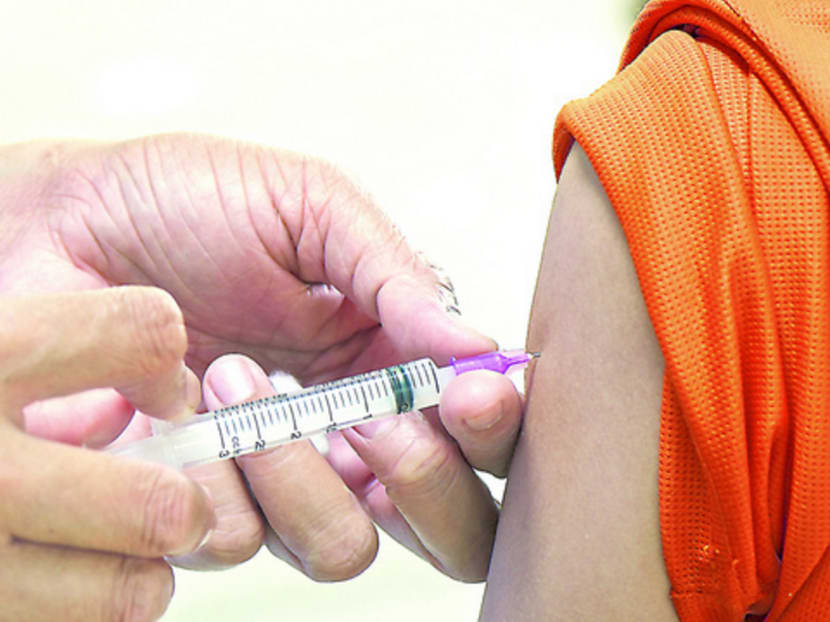HPV jabs would be of benefit to boys too
SINGAPORE — Vaccinating 12-year-old boys against human papillomavirus (HPV) might be a cost-effective strategy for preventing oropharyngeal squamous cell cancer, which affects the back of the throat and mouth, a Canadian study has found.

In Singapore, HPV vaccination is available for both girls and boys from the age of nine. Photo: Thinkstock
SINGAPORE — Vaccinating 12-year-old boys against human papillomavirus (HPV) might be a cost-effective strategy for preventing oropharyngeal squamous cell cancer, which affects the back of the throat and mouth, a Canadian study has found.
The study was published online last month in Cancer, a peer-reviewed journal of the American Cancer Society.
When the investigators applied a statistical model to a population of 192,940 Canadian boys who were 12 years old in 2012, they found that HPV vaccination could save up to C$28 million (S$31 million) over the boys’ lifetimes.
“We believe this study is important because HPV-related oropharyngeal cancer has increased significantly in incidence, especially in developed countries,” said one of the study’s authors, Dr Donna Graham from Princess Margaret Cancer Centre, University Health Network.
“It is projected that, by 2020, HPV-related oropharyngeal cancer will become the most common HPV-related cancer in the United States, surpassing cervical cancer.”
In Singapore, HPV vaccination is one of the National Childhood Immunisation Programme’s (NCIP) recommended vaccinations for girls between nine and 26 years old, to reduce their risk of cervical cancer. NCIP does not extend the same recommendation to boys of the same age.
Parents who choose to vaccinate their daughters can opt to use their Medisave — capped at S$400 per Medisave account per year.
That has not stopped some parents from signing their sons up for the vaccination too. HPV vaccination was licensed for males aged nine to 26 years old in Singapore in early 2011, said Dr Quek Swee Chong, clinical director of Parkway Gynaecology Screening and Treatment Centre at Gleneagles Hospital.
Dr Quek estimated that about five out of every 100 HPV shots he administers in his practice are for males.
Targeting HPV
In both genders
HPV is known to be the most common cause of cervical cancer, which is the 10th-most-common cancer among women in Singapore. Around 190 new cases are diagnosed each year.
However, women are not the only ones at risk of contracting the viral infection, which is commonly spread via sexual skin-to-skin contact.
HPV is also known to be responsible for causing genital warts as well as other types of cancers, including cancer of the vulva, vagina, anus and oropharynx or the back of the throat, said Dr Quek.
More than 1,000 new genital wart cases have been recorded each year over the past 10 years, said Dr Martin Chio Tze-Wei, senior consultant and head of DSC Clinic.
There are currently no firm statistics on HPV-related oropharyngeal cancers in Singapore. However, a National University Hospital (NUH) study showed that about 41 per cent of oropharyngeal cancer cases is linked to HPV, said Dr Lim Chwee Ming, consultant at the Division of Surgical Oncology (Head and Neck Surgery) at the National University Cancer Institute, Singapore (NCIS).
According to Dr Quek, HPV-related oropharyngeal cancers in men are postulated to be spread by oral sex. “It is possible that by vaccinating men as well as women, these other HPV-related cancers could be prevented as well,” said Dr Quek.
HERD IMMUNITY
Even without vaccinating men, vaccinating women may help protect men from HPV-related infections too.
Dr Ida Ismail, an associate consultant at the Division of Gynaecologic Oncology at NCIS, noted that Australian studies have shown a significant reduction in the incidence of HPV-related infection, including genital warts, since its school HPV vaccination programme was launched in 2007.
“What is also interesting is that, in Australia, not only is the incidence of genital warts (caused by HPV subtypes 6 and 11) significantly lower in girls, (they are also lower) in boys who have not taken the HPV vaccine. This is evidence of herd immunity,” said Dr Ida.
The HPV vaccine is listed in the NCIP but it is not mandatory. Dr Quek believes that to achieve optimal protection against cervical cancer, HPV vaccination should be part of a universal mass vaccination programme.
This is the case in countries such as Australia and the United Kingdom, where all girls, usually between the ages of 11 and 13 years, are vaccinated while they are in school, he said.
“If unlimited funds were available for healthcare, I would advocate vaccinating both males and females, as this could theoretically reduce the number of all HPV-related cancers in both sexes,” said Dr Quek. However, he said that more studies need to be done before recommending routine HPV vaccination for both sexes.
Dr Ida said parents who are considering the HPV vaccination for their sons should discuss it with their doctor.





